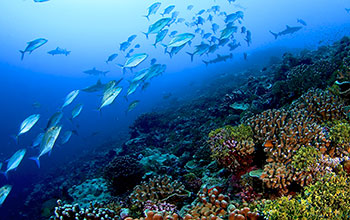Multimedia Gallery
Healthy coral reef dominated by calcifying corals and coralline algae
A healthy coral reef dominated by calcifying corals and coralline algae in the Line Islands in the central Pacific Ocean. A recent study explores how a process called microbialization destroys links in the delicate coral-reef food chain.
More about this image
Coral reefs, the world's most productive and diverse marine ecosystems, rely on a masterful recycling system to stay healthy. Corals and algae release nutrients that support a complex and efficient reef food chain. But when the system gets out of whack, the cycle breaks down and endangers the reef's health. A recent study explored how a process called microbialization destroys links in this delicate food chain.
Millions of people around the world depend on coral reefs for productive fisheries. In addition, reefs play an important role in global environmental health. Overfishing the waters near coral reefs, however, removes the primary algae eaters from the environment, allowing populations of fleshy algae to explode. In areas with large human populations, pollution often exacerbates the problem by stimulating these algae.
"This well-documented study shows that human activities are affecting coral reefs in very subtle ways," said David Garrison, a program director in the National Science Foundation (NSF) Division of Ocean Sciences, which funded the research (grant OCE 1538393).
Fleshy algae on reefs release copious amounts of nutrients known as dissolved organic carbon, which microbes eat. The researchers theorized that when increased levels of algae produce meals for microbes, there are also higher levels of potentially harmful microbes throughout the reef ecosystem, thereby endangering corals by depleting oxygen from the environment or by introducing disease. As the corals die off, the algae have even more space to take over, leading to further coral mortality.
When reefs are dominated by fleshy algae, "most of the energy in the ecosystem goes to the microbes," said the study's lead author, Andreas Haas, a biologist at San Diego State University. "It doesn't support the variety of reef organisms that make up a healthy system."
For the study, Haas and co-author Mohamed Fairoz of the Ocean University of Sri Lanka collected more than 400 water samples from 60 coral-reef sites across the Indian, Pacific and Atlantic oceans. Back in the lab, they tested these samples for evidence of microbialization of algae-dominated reefs, looking for more microbes with more potential to harm reef organisms. They analyzed the abundance of microbes throughout the samples and found that reef sites with more algae had more harmful pathogens, or disease-causing microbes.
The study's results, the scientists say, support the idea that microbialization linked with increasing algae on coral reefs can decimate the reef ecosystem through microbial takeover.
[This text was taken from NSF Research News story Too much algae -- and too many microbes -- threaten coral reefs.] (Date image taken: 2004-2014; date originally posted to NSF Multimedia Gallery: Aug. 5, 2016)
Credit: Dr. Jennifer Smith, Scripps Institution of Oceanography
See other images like this on your iPhone or iPad download NSF Science Zone on the Apple App Store.
Images and other media in the National Science Foundation Multimedia Gallery are available for use in print and electronic material by NSF employees, members of the media, university staff, teachers and the general public. All media in the gallery are intended for personal, educational and nonprofit/non-commercial use only.
Images credited to the National Science Foundation, a federal agency, are in the public domain. The images were created by employees of the United States Government as part of their official duties or prepared by contractors as "works for hire" for NSF. You may freely use NSF-credited images and, at your discretion, credit NSF with a "Courtesy: National Science Foundation" notation.
Additional information about general usage can be found in Conditions.
Also Available:
Download the high-resolution JPG version of the image. (9.5 MB)
Use your mouse to right-click (Mac users may need to Ctrl-click) the link above and choose the option that will save the file or target to your computer.

 All images in this series
All images in this series